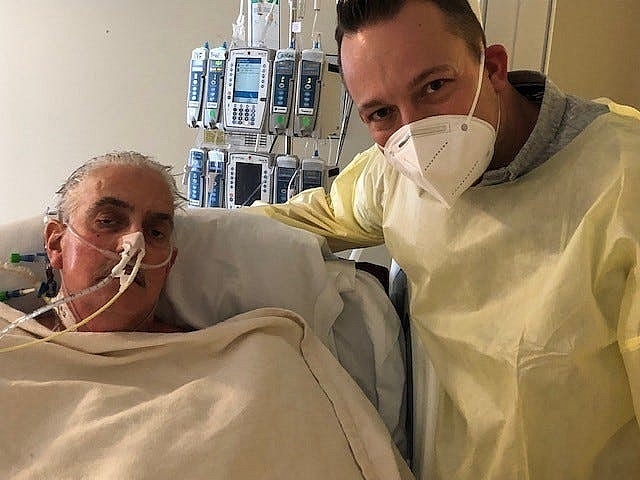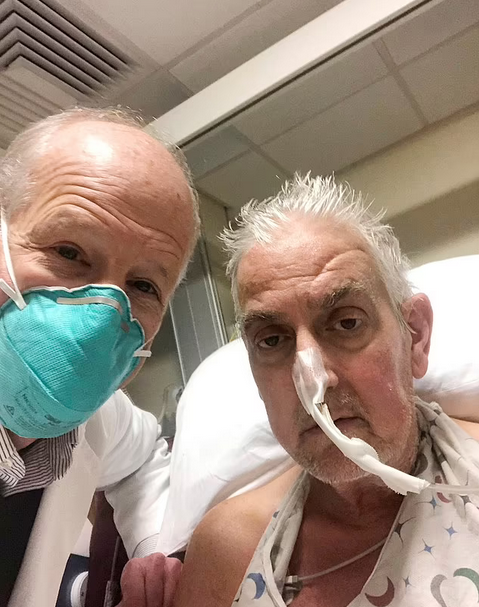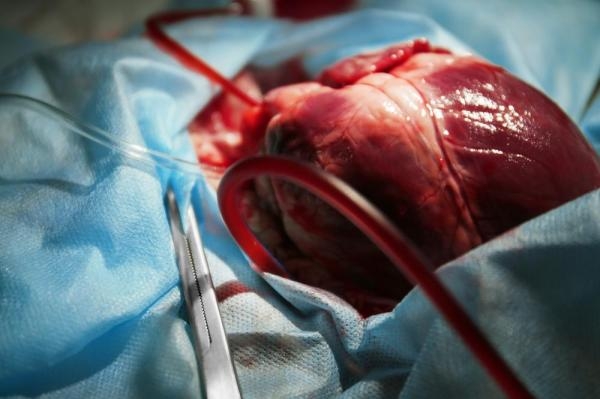Who is 'Pig Heart' David Bennett: Died 2 Months after Transplant
 |
| Pig Heart David Bennett Died |
Update:
David Bennett, 57, had received his transplant on January 7 and passed away March 8, the University of Maryland Medical System said in a statement.
"His condition began deteriorating several days ago. After it became clear that he would not recover, he was given compassionate palliative care. He was able to communicate with his family during his final hours," the statement said.
It's not yet clear precisely what caused Bennett's death, according to the University of Maryland Medical Center, where he received the transplant Jan. 7 and had been recovering since. He began deteriorating in recent days and the hospital announced his death Wednesday.
A 57-year-old man has become the first person in the world to get a heart transplant from a genetically-modified pig.
David Bennett is reportedly being closely monitored after the surgery, but the crucial 48 hours have passed without any major concern. He was connected to a heart-lung bypass machine but the animal's heart had already started functioning and was helping him breathe.
In the time after his surgery, Bennett spent time with family, participated in physical therapy, watched the Super Bowl and spoke often about wanting to go home to see his dog Lucky. "He proved to be a brave and noble patient who fought all the way to the end. We extend our sincerest condolences to his family," said Bartley Griffith, the surgeon who led the procedure.
There was no obvious cause identified at the time of his death, hospital spokeswoman Deborah Kotz said, and researchers plan to conduct a thorough review of his death and publish the results in a peer-reviewed journal.
| Prior attempts at such transplants -- or xenotransplantation -- have failed largely because patients' bodies rapidly rejected the animal organ. This time, the Maryland surgeons used a heart from a gene-edited pig: Scientists had modified the animal to remove pig genes that trigger the hyper-fast rejection and add human genes to help the body accept the organ. |
The investigative surgery, although it only added two months to Bennett's life, informed the field of xenotransplantation, which hopes to help solve the human organ shortage.
USA Today reported: “We have gained invaluable insights learning that the genetically modified pig heart can function well within the human body while the immune system is adequately suppressed,” Dr. Muhammad Mohiuddin, an expert in interspecies transplants who was involved in Bennett's care and at the University of Maryland School of Medicine, said in a statement. “We remain optimistic and plan on continuing our work in future clinical trials.”
Who is David Bennett with Pig Heart: Biography, Personal Life
David Bennett is a 57-year-old man from Maryland who recently created history by becoming the first recipient of a pig heart during an experimental heart transplant surgery.
He was previously suffering from a life-threatening terminal cardiac condition that made him bedridden for six months and only allowed him to breathe with the help of a machine.
Mr. Bennett agreed to be part of the experimental surgery as he was declared ineligible for a human heart transplant, stopped responding to other treatments, and had no other chance of survival. Prior to his surgery, he told officials it was his last choice and he was looking forward to his recovery:
“It was either die or do this transplant. I want to live. I know it’s a shot in the dark, but it’s my last choice. I look forward to getting out of bed after I recover.”
David Bennett - Criminal Record
The New York Times divided social media users when on Thursday it reported on the criminal record of David Bennett, the man who recently received a pig’s heart in a landmark surgical procedure.
In 1988, when Bennett was in his 20s, he stabbed Edward Shumakar multiple times in a fit of jealousy.
Shumaker was paralysed from waist down and spent the rest of his life in a wheelchair, in and out of nursing homes, until he died in 2007 at the age of 40.
Bennett was sentenced to 10 years in prison after he was convicted on the charges of battery and carrying a concealed weapon. But he was released after six years.
People questioned whether it was right to highlight a patient’s previous criminal record when he’s already going through a health crisis.
Even though Bennett had served his time in prison and was acquitted, the rationale to place convicts on the organ transplant waiting list has been a thorny topic in the US.
David Bennett is the first person to get a pig's heart
 |
| Photo: 6 days ago International Business Times, Singapore |
The US medical regulator gave doctors at the University of Maryland Medical Center a special dispensation to carry out the procedure. Bennett had been deemed ineligible for a human transplant. The transplant in question was carried out after years of research. Bennett was bedridden for six weeks leading up to the surgery. He was diagnosed with terminal heart disease.
In a medical first, doctors have transplanted a pig heart into a patient, in a last-ditch effort to save his life. And three days after the highly experimental surgery, a Maryland hospital said Monday that the patient is doing well.
While it's too soon to know if the operation really will work, it marks a step in the decades-long quest to one day uses animal organs for life-saving transplants. Doctors at the University of Maryland Medical Center, near Baltimore, say the transplant showed that a heart from a genetically modified animal can function in the human body without immediate rejection.
‘We can’t give you a human heart. You don’t qualify. But maybe we can use one from an animal, a pig. It’s never been done before, but we think we can do it.’ I wasn’t sure he was understanding me. Then he said, ‘Well, will I oink?’ said Dr. Griffith.
How did the historic heart transplant surgery take place?
Xenotransplantation, or the process of grafting or transplanting organs or tissues between members of separate species, has long been part of medical history. In 1983, an infant named Baby Fae received a baboon heart for transplant.
However, she passed away 20 days after the surgery. More recently, surgeons in New York successfully transplanted a pig kidney into a human body. Although the recipient was brain dead at the time, the surgery was deemed successful.
Ahead of the latest heart transplant, the one-year-old 17-stone donor pig was genetically edited and bred for the purpose of the surgery. The genetic alteration was provided by a regenerative medicine company called Revivicor.
 |
| Photo: Gephardt Daily |
The pig reportedly underwent 10 genetic modifications. During the procedure, four genes were inactivated, including a gene that causes a rejection response from the human body. The growth gene was also inactivated to prevent the pig's heart from growing after the implant.
Researchers also inserted six human genes into the genome of the pig to make the organ more suitable for the human immune system. A new drug made by Kiniksa Pharmaceuticals and partly developed by Dr. Muhammad Mohiuddin was used to “prevent rejection” and “suppress the immune system.”
The Food and Drug Administration finally provided an “emergency authorization” and gave the team of surgeons a nod to conduct the surgery on David Bennett towards the end of 2021.
'Endless supply' of organs if animal transplants work
Last year in the U.S., there were just over 3,800 heart transplants — a record number — according to the United Network for Organ Sharing (UNO), which oversees the nation's transplant system.
Numbers are also up in Canada. In 2019, more than 3,000 organ transplant procedures in total were performed, an increase of 42 per cent since 2010, according to the latest data from the Canadian Organ Replacement Register (CORR) — a pan-Canadian information system for organ failure in Canada.
"If this works, there will be an endless supply of these organs for patients who are suffering," said Dr. Muhammad Mohiuddin, scientific director of the animal-to-human transplant program at the University of Maryland.
But prior attempts at such transplants — or xenotransplantation — have failed, largely because patients' bodies rapidly rejected the animal organs. Notably, in 1984, Baby Fae, a dying infant, lived 21 days with a baboon heart.
The difference this time: The Maryland surgeons used a heart from a pig that had undergone gene-editing to remove a sugar in its cells that's responsible for that hyper-fast organ rejection.
The surgeon who successfully transplanted a pig heart into a patient says the cardiac team has prepared for David Bennett, Jr.'s body to put up a fight against the foreign organ. 0:58
"The big issue with the story is that with transplants, the issue is always that you need to find a match, and your body will very quickly reject a heart from another species," Dr. Christopher Labos, a Montreal-based cardiologist, told CBC News in an email exchange.
"The interesting thing to me is that they were able to make a genetically modified pig that suppressed the cell markers that would lead to rejection. That's very interesting, going forward."
COVID-19 fuelling an increase in double-lung transplants in B.C., specialist says
"I think you can characterize it as a watershed event," Dr. David Klassen, UNOS' chief medical officer, said of the Maryland transplant.
Still, Klassen cautioned that it's only a first tentative step into exploring whether this time around, xenotransplantation might finally work.
The Food and Drug Administration, which oversees xenotransplantation experiments, allowed the surgery under what's called a "compassionate use" emergency authorization — available when a patient with a life-threatening condition has no other options.
"A breakthrough surgery"
 |
| Photo: Purdue Exponent |
“This was a breakthrough surgery and brings us one step closer to solving the organ shortage crisis. There are simply not enough donor human hearts available to meet the long list of potential recipients,” said Bartley P Griffith, MD, who surgically transplanted the pig heart into the patient.
"Organs from genetically modified pigs have been the focus of much of the research in xenotransplantation, in part because of physiologic similarities between pigs, human, and nonhuman primates. UMSOM received a $15.7 million sponsored research grant to evaluate Revivicor genetically-modified pig UHearts™ in baboon studies," the University of Maryland School of Medicine said.
"Three genes—responsible for rapid antibody-mediated rejection of pig organs by humans—were “knocked out” in the donor pig. Six human genes responsible for immune acceptance of the pig heart were inserted into the genome. Lastly, one additional gene in the pig was knocked out to prevent excessive growth of the pig heart tissue, which totaled 10 unique gene edits made in the donor pig," it added.
 Who is Jisoo - World Most Beautiful Star: Biography, Personal Life and Career Who is Jisoo - World Most Beautiful Star: Biography, Personal Life and Career Jisoo - World Most Beautiful Star - is famous for her pure beauty as well as her talents. She is the leader of Blackpink, who ... |
 Who Is BTS Jungkook - World Most Handsome Star: Biography, Personal Life and Career Who Is BTS Jungkook - World Most Handsome Star: Biography, Personal Life and Career BTS (Bangtan Sonyeondan) is a globally famous boyband in Korea, which steals millions of girls' hearts. Jungkook - World's Most Handsome Star - is the ... |
 Who Is Robert Redford - Most Handsome Actor: Biography, Personal Life and Career Who Is Robert Redford - Most Handsome Actor: Biography, Personal Life and Career Captain America star Robert Redford is trending on Twitter as fans debate the most handsome man that has lived in their lifetime. Who is he? ... |























